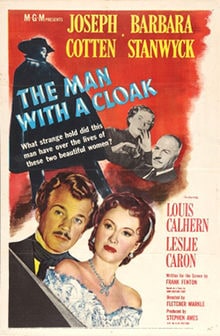What strange hold did this man have over the lives of these two beautiful women?
Coming on as deep and mysterious is 1951’s The Man with a Cloak. Though failing slightly on the former and by a wide margin on the latter, there’s still a fair amount to enjoy in this one. More accurately termed a suspenseful melodrama, The Man with a Cloak features excellent casting which successfully overcomes an at times set bound and wordy picture.
In the title screens, we’re given a teaser that the man with the cloak is travelling under an alias. Though this is initially enticing, we soon lose interest in figuring out who the cloaked man really is and by the time of his big reveal in the closing moments of the film it’s already been about forgotten. That said, if you’re paying much attention, there’s no real secret to who the cloaked man going by the name of Dupin (and played by Joseph Cotten) really is.
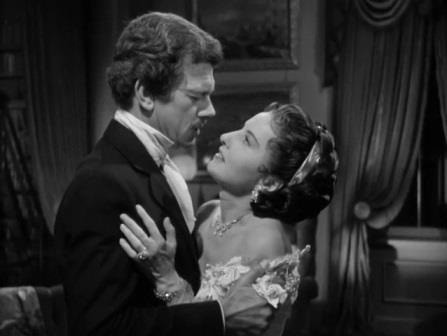 Though not perhaps as clearly effective as his costar Stanwyck, Cotten is engaging and earnest without becoming a parody of himself, which would be easy to do given the material. Wandering presumably from town to town, Dupin’s work as an author guarantees him little in the form of financial security, and he’s soon looking for funds to pay his increasing bills both for his room and his much beloved wine. Unlike most however, he seems uninterested in Thevenet’s money, at least in getting it directly. Rather, he’ll dally potential relationships teasingly with both Stanwyck and Leslie Caron to get whatever funds they may have.
Though not perhaps as clearly effective as his costar Stanwyck, Cotten is engaging and earnest without becoming a parody of himself, which would be easy to do given the material. Wandering presumably from town to town, Dupin’s work as an author guarantees him little in the form of financial security, and he’s soon looking for funds to pay his increasing bills both for his room and his much beloved wine. Unlike most however, he seems uninterested in Thevenet’s money, at least in getting it directly. Rather, he’ll dally potential relationships teasingly with both Stanwyck and Leslie Caron to get whatever funds they may have.
There’s little physical chemistry with Stanywck, however, which actually works outstandingly well, giving proof that any potential liason would simply be the culmination of a business relationship. Though less explicit, his relationship with the incredibly young Leslie Caron is borderline creepy though no less effective. Caron was 20 at the time of filming as opposed to Cotten’s then age of 46, though the age disparity seems even more wide ranging than a mere 26 years.
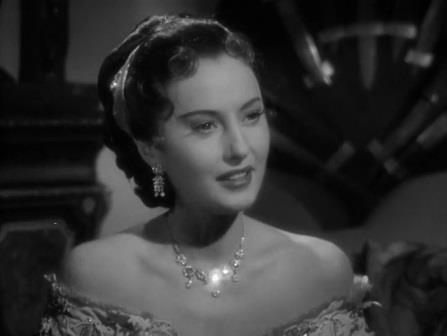 Leading the way is strong casting in the forms of Barbara Stanwyck as Lorna Bounty, a former actress and now the housekeeper for her aging lover, Charles Thevenet (Louis Calvern). Although clear from the start that Lorna- in addition to literally almost everyone in earshot- is clinging to the aging and ill Thevenet in an effort to get at his considerable fortune- it’s good to see Stanwyck in such a deliciously sinister role. She’s at one moment flirtatious, the next cloying and the next vengeful all in the space of a few minutes (and sometimes with the same person). But strangely we are in on the secret that among all the cast, she’s the one that will do almost anything for pot of gold at the end of the rainbow.
Leading the way is strong casting in the forms of Barbara Stanwyck as Lorna Bounty, a former actress and now the housekeeper for her aging lover, Charles Thevenet (Louis Calvern). Although clear from the start that Lorna- in addition to literally almost everyone in earshot- is clinging to the aging and ill Thevenet in an effort to get at his considerable fortune- it’s good to see Stanwyck in such a deliciously sinister role. She’s at one moment flirtatious, the next cloying and the next vengeful all in the space of a few minutes (and sometimes with the same person). But strangely we are in on the secret that among all the cast, she’s the one that will do almost anything for pot of gold at the end of the rainbow.
Though the object of the explicit mystery in the film, poor Thevenet (Louis Calhern) doesn’t actually pass until the beginning of the final quarter of the picture. Thevenet’s a character that (like most here) have a clear backstory that might be worth exploring as Calhern plays him clearly as a complex man. Though viewed as a disintegrating drunkard unaware of what’s going on around him, it’s clear through conversations with both Dupin and Madeline Minot (Leslie Caron) that he’s completely aware that everyone is after his money and just lingering on waiting for his ultimate demise. He clearly delights in making his staff jump to his merest seemingly arbitrary desire.
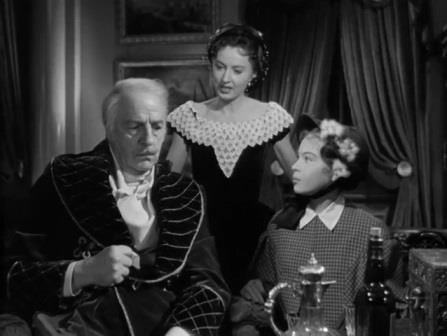 If there is a weak link in the four leading stars, it’s Leslie Caron as the young girl Madeline Minot, just arrived in New York City from Paris, where she’s involved with Thevenet’s grandson and only living relative. She plays the role as written; as a perceptive and intelligent young girl masquerading as a naive and doe-eyed near adolescent. Sadly the results are mixed and result in a character who seems rather dim and slow, though animated at the same time.
If there is a weak link in the four leading stars, it’s Leslie Caron as the young girl Madeline Minot, just arrived in New York City from Paris, where she’s involved with Thevenet’s grandson and only living relative. She plays the role as written; as a perceptive and intelligent young girl masquerading as a naive and doe-eyed near adolescent. Sadly the results are mixed and result in a character who seems rather dim and slow, though animated at the same time.
In the supporting cast the best standout is Jim Backus as the bartender Flaherty. He plays it serious and thoughtful, in a refreshing reminder that there was more to Backus than Mr. Magoo and Thurston Howell.
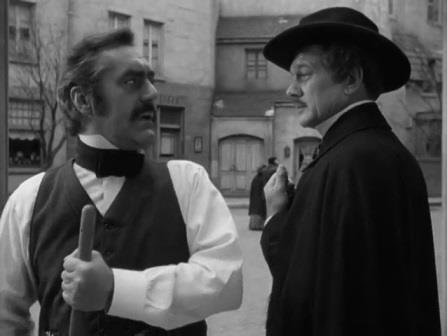 Though naturally limited by the script, The Man with the Cloak feels like old time television, which makes sense given that director Fletcher Markle was primarily a director on the small screen. That said, the sets are all well done, especially Thevenet’s home, which is full of all the expected accoutrements of the period. We’ve got also a lot of character pieces in the form of a well stocked library, busts of Napoleon and other items which will help you identify the true identity of the man in the clock should you be so inclined.
Though naturally limited by the script, The Man with the Cloak feels like old time television, which makes sense given that director Fletcher Markle was primarily a director on the small screen. That said, the sets are all well done, especially Thevenet’s home, which is full of all the expected accoutrements of the period. We’ve got also a lot of character pieces in the form of a well stocked library, busts of Napoleon and other items which will help you identify the true identity of the man in the clock should you be so inclined.
The Man with a Cloak doesn’t appear often for viewing which is unfortunate as it’s a fun and engaging story with some great performances, especially by Barbara Stanwyck and Joseph Cotten.
